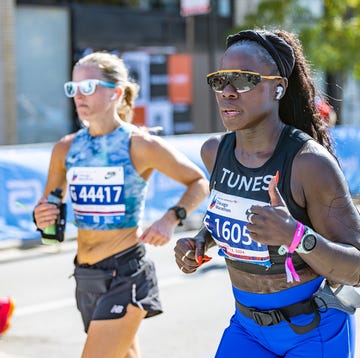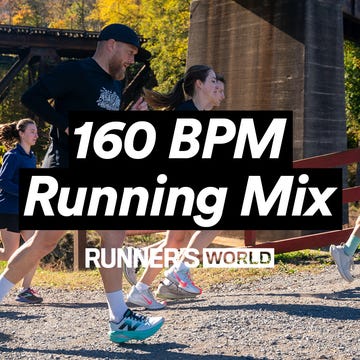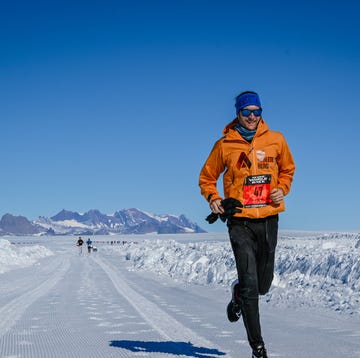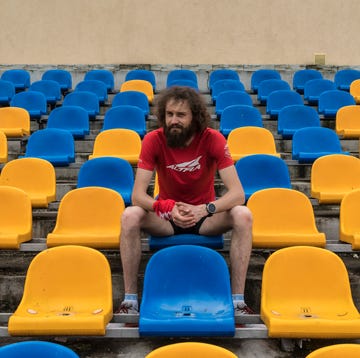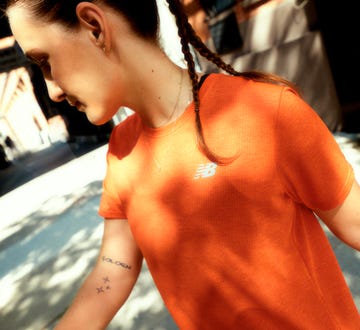Couch to 5K Plan Boston Marathon The Best Songs to Add to Your Playlist this Month.
On race day—April 16, 2007—I was 42 years old, in the best shape of my life at 5'7" and 175 pounds, and I ran the race as a qualified, registered entrant into the teeth of a freezing rainstorm in about three hours and 30 minutes. Jacob was 26 years old, 6'2" and 355 pounds, and started out so far behind the last registered entrant he hardly counted as a bandit. His final time? Somewhere north of eight hours—who knows?
Oh, I knew about Jacob, back then, as I tapered for Boston. Somebody pointed me to his website, “What Would Jacob Do?” and there was this indolent man, who had decided to “run the Boston Marathon” on a whim, without adequate training, physical capacity, or, of course, qualifying for or registering for the race.
And reader: I hated him. Not personally, of course, although my disapproval of everything about him took on an emotional heat. I had trained my guts out to qualify for Boston, and then again to run it decently, and this guy, weighing 440 pounds, just decides he’s going to “run” the Boston Marathon by shuffling down the course long after the rest of us? Not only was it an affront to our—my!—achievement, it was a terrible idea. Anybody with any ounce of sense knows that deciding to go from “couch to marathon” is exactly the wrong way to start running. Decide to do something impossible! Make yourself miserable attempting it! Maybe die from a coronary! Good idea, pal.
I ran the race and flew back to Chicago and checked in on Jacob’s website. There were pictures of him “running” the “Boston Marathon” by shuffling down a sidewalk in Framingham. Ha. And then, with a last smug sniff, I forgot about Jacob.
Recently, though, I’ve been working on a book about running, and I considered using Jacob as an example of Everything You Should Not Do As An Aspiring Runner. But fairness required that I actually talk to him. Thanks to Facebook, it was easy to find him in Andover, Massachusetts, where he works as a tax consultant, and thanks to NPR, he recognized my name and was happy to talk to me.
One doesn’t want to lightly throw about the word “jolly” when talking to people who’ve struggled with obesity and a huge range of other health issues, but I know a lot of rail-thin ectomorphs in perfect health who couldn’t conjure Jacob’s effortless charm on a bet. And the first thing he told me: He thought his run in Boston was ridiculous, too.
Jacob had always been a big guy, but also an athlete, playing football as a lineman at Colby College. But not long after his graduation, his father died, and he had to go to Texas to help dispose of his family’s bee-keeping business, and well… “I was stressed, depressed, unsure, and was eating and drinking way too much…and by the time I went to law school in New Hampshire, I weighed 440 pounds.”
He had some friends there who regularly joined the crowds of bandits who ran the Boston course after the official entrants every year—this was before the post-2013 crackdown—and in January 2007 one of those friends, Mike Moran, urged Jacob to do it with them. That very year. Three months later. “He was trying to find a way to help me to not be so fat,” says Jacob now, “so he said, ‘You can do it! You just have to get in decent shape!’ And I said okay, and then he put up a website and told all our friends! So I figured I had to do it.”
Driven almost entirely by a desire not to quit in front of his friends and the world, and also by a glimmer of hope that the Boston Marathon could help him get out of the pit he was in, Jacob turned himself over to the effort. Mike had told him he could lose 100 pounds in just three months of training for a marathon, so Jacob bought a stationary recumbent bike and started pedaling. We should say here, if only for legal reasons, that attempting to lose 100 pounds in three months is a terrible idea. Most experts say that a healthy rate of weight loss should be no more than one or two pounds a week.
“I knew it was a bad idea,” Jacob told me on the phone, laughing. “I’ve made a life of bad ideas.”
So: Jacob started biking 30 minutes a day, then worked his way up to eight hours a day, sitting on that bike. Then running. The longest Jacob ran prior to the marathon was 10 miles, which took him about three hours. And the weight dropped off; by the time he got to Hopkinton on Monday, April 16, 2007, he was down to 355 pounds, an astounding loss just 15 pounds short of his goal. (But, Jacob points out now, he lost 10 pounds during the race, so he practically made it!) The crowd of qualified and charity runners (me somewhere in it) had long vanished down East Main Street out of Hopkinton, and Jacob and his three friends—Mike, Luke Webster, and Andrew Fleming—started out after them. (A fourth pal never appeared, until he showed up drunk in Kenmore Square many, many miles later.)
“For the first few miles, I’d see a water station ahead,” remembers Jacob, “and then from a half mile away I could see them tearing it down.” There were no crowds, no Wellesley Scream Tunnel, no roadside support. When he needed hydration or nutrition, Mike or Luke or Andrew would pop into a 7-Eleven and grab some bottles and bars. Talking to Jacob, I began to realize that whether or not my marathon that day was more legitimate, his was a hell of a lot harder.
He got to the 10-mile marker “on pace,” at about three hours, but his race “fell apart” around mile 17. (In this, it turns out, Jacob and I did have something in common.) In his case, although his strength and breath were holding up, his feet were wrecked.
“I could barely walk,” Jacob told me. “My feet weren’t trained to endure the bone-crushing weight for that many hours. The last eight miles, I could either sprint or sit down. Sprinting seemed to take the weight off my feet. So I would sit a little, then I’d sprint, then I would have to sit down again. It took twice as long to do the last 10 miles as it had the first 10. And we got lost in Brookline, and ran an extra half mile or so. The official marathon was long over, so there was traffic everywhere, and we took a wrong turn.”
But Jacob persevered. He and his friends slowly made their way through Brookline and Boston, and then, just like every other Boston Marathoner, he sprinted down Boylston to the finish line—albeit hours after the race was over, and in the dark. Some guy in a bar yelled at him: “You think you’re running the marathon?” And Jacob responded, “F--- yeah!”
And then he celebrated by hurrying back to law school in New Hampshire, where he had to perform the next evening in a mock court exam—on his feet, in quickly purchased shoes two sizes larger than his normal size, because his feet were so swollen.
Eight hours in the cold, wet, and dark—don’t forget the weather was so miserable on that day the organizers actually considered canceling the race—to end up with nothing to show for it but swollen feet. Does Jacob regret his run? Absolutely not. “It was one of the best senses of accomplishment I’ve ever had.”
Since that day in 2007, Jacob has managed, fitfully, to keep the weight off. (He’s at 350 pounds now and has started training for a 5K in Washington, D.C., on May 1.) Which is pretty incredible, considering everything else he’s had to endure. First Lyme disease, and then, practically the same day he got engaged, he got a call from his doctor saying the seizure he’d had in his sleep was glioblastoma, the most virulent kind of brain tumor. Surprise! In the last few years, Jacob has been in and out of surgery, radiation, and chemo, gotten married, gone back to work—and then the cancer recurred. Now he’s on sick leave and has immunotherapy infusions every two weeks, keeping his spirits up despite his stage 4 cancer.
And, he is certain, his remarkable, improbable run helps him get through it. “I can always look back on the most physically miserable day of my life and put things in a physical perspective. If I’m feeling like s---, I can say I won’t feel as s----- as I did at the end of the race.” He’s known around the infusion center as one of the more upbeat patients, he says, and after talking to him for an hour, I completely believe him.
So, yes, Jacob Seilheimer did everything wrong. And his marathon was nothing like those run by each of the 20,339 official finishers, including me. Someone who worked really hard to run Boston and was a little full of himself, like, say, the younger me, could get a bit miffed at a guy like Jacob. Makes the whole thing less special, if someone like him could say he did it…
…But with age, along with slower times, hopefully, comes wisdom. Yes, I had done everything right, and Jacob had done everything wrong. Doesn’t that make his accomplishment even more impressive? I had been training for years before coming to Boston, logging thousands of miles. Three months before the race, Jacob had a hard time climbing stairs. And yet he made it, enduring more than twice my time out in the wind and rain, suffering physical pain that would have stopped me cold, and doing it all for no medal, in front of no crowd—hell, he couldn’t even really brag about it. But he said he would do it, so he did it. As he put it during his finish, “F--- yeah!”
So, in brief: Many years after getting all pissy at some stranger I saw on the internet, I spoke to him, and not only do I now admire him, I find myself proud of him. No, I still can’t claim to know him. But he’s a man who determined to do something nobody thought he could or should do, and he succeeded. And now, he’s going through an unimaginable trial with cheer, courage, and grace. And if those weren’t enough reasons to be proud of Jacob—hey, he’s a fellow marathoner. We ran Boston together.
* * *
Peter Sagal is a 3:09 marathoner and the host of NPR’s Wait, Wait…Don’t Tell Me! For more, click here.


